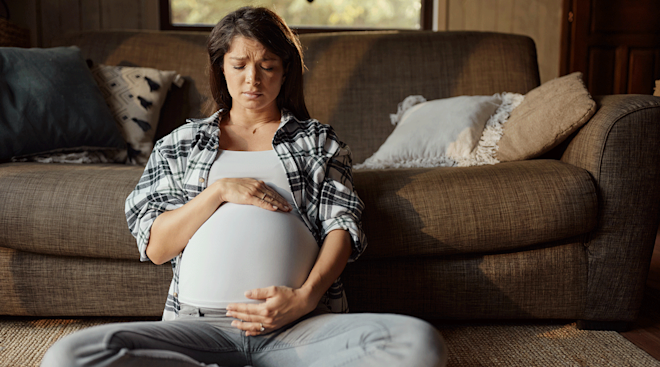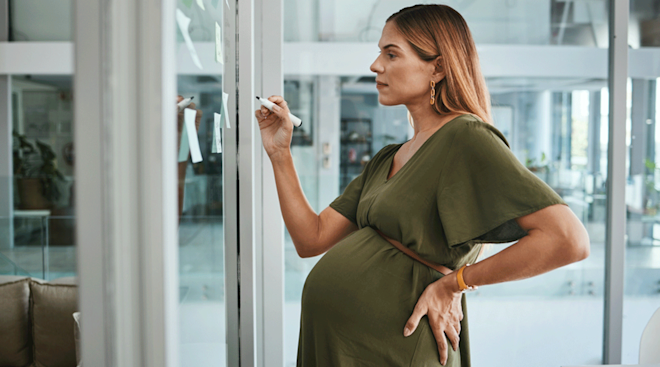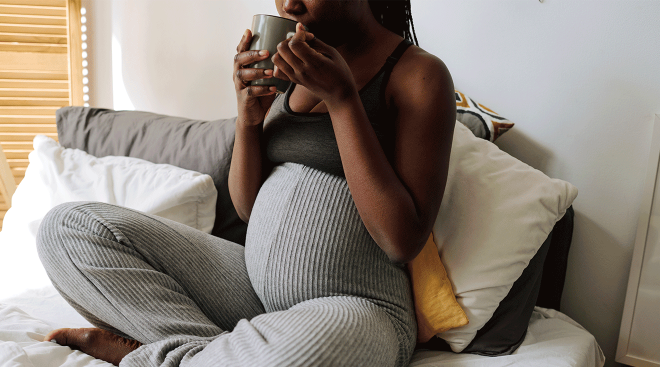CDC: a Surprising Number of Moms-to-Be Still Aren’t Getting This Vital Vaccine
Baby’s health and happiness is top priority for parents, and questions about how to keep your child safe abound during pregnancy. But many moms-to-be are missing an important opportunity to protect their babies from pertussis, more commonly known as whooping cough.
In 2017, only half (50.4 percent) of pregnant women received a whooping cough vaccine (Tdap) during their pregnancy, according to the Centers for Disease Control and Prevention (CDC). That rate has been steady for a few years now, meaning half of all babies are born without the best possible protection for whooping cough.
In honor of National Immunization Awareness Month—an annual observance held each August to emphasize the importance and benefits of vaccination for preventing serious diseases for all ages—we’re taking a close look at whooping cough and why the vaccine is so crucial during pregnancy.
Whooping cough is a contagious respiratory illness that’s especially dangerous to infants. Over the past decade, about 1,000 babies were hospitalized and typically between five and 15 babies died from whooping cough each year in the US. Almost all the deaths occurred in infants under 3 months old. Babies with whooping cough can develop a rapid cough and apnea, a sleeping disorder where breathing is interrupted. But keep in mind that many babies with this disease don’t cough—instead, they can stop breathing and turn blue.
Since 2012, CDC has recommended that pregnant women receive a Tdap vaccine during each pregnancy in order to help protect their babies. The recommended time to get the shot is during weeks 27 through 36 of pregnancy, preferably during the earlier part of this timeframe. The mother’s protective antibodies that pass to the baby are at their highest levels about two weeks after being vaccinated.
Getting vaccinated while pregnant is important because babies don’t receive the childhood whooping cough vaccine (DTaP) until they’re 2 months old. CDC findings show Tdap vaccination during the third trimester of pregnancy prevents more than 3 in 4 cases of whooping cough in babies younger than 2 months old. That means getting a Tdap vaccine during pregnancy is highly effective in protecting babies until they’re old enough to start getting their own whooping cough vaccine.
There’s more good news about getting this vaccine while pregnant: For babies who do get whooping cough, the infection is typically less serious if their moms received a Tdap vaccine during pregnancy. In fact, getting a Tdap vaccine during the third trimester of pregnancy protects 9 in 10 babies from infections serious enough for hospitalization.
So why are so many women not getting a Tdap vaccine during their pregnancies? A 2016 CDC survey revealed that 1 in 4 unvaccinated pregnant women weren’t aware they needed the vaccine. Pregnant women also had concerns about the safety of Tdap vaccine. Both CDC and the Food and Drug Administration (FDA) continuously monitor vaccine safety, and have found that administering a Tdap vaccine during pregnancy is very safe for mom and baby. Most people who get a Tdap vaccine don’t have any problems with it, and side effects—which can include swelling or tenderness at the injection site, body aches, fatigue and fever—are usually mild and go away on their own.
As you’re busy installing the car seat and stocking up on diapers in preparation for baby’s arrival, talk with your ob-gyn or midwife about the vaccines you need, including a Tdap vaccine. You can get it at a doctor’s office, local health department or pharmacy. By being up to date on your vaccinations, you can provide the best protection possible for your baby against serious, preventable diseases.
Parenting is an amazing but challenging journey, and plenty of questions crop up along the way. Like many parenting topics, vaccination can feel overwhelming–which is why CDC has a guide to help you learn what vaccines your child needs from birth to graduation.
Fiona Havers, MD, MHS, is a medical officer in the Division of Bacterial Diseases at CDC. She completed medical school at the University of Washington and internal medicine and infectious diseases training at the Johns Hopkins Hospital. Havers also has a master’s degree in epidemiology from the Johns Hopkins Bloomberg School of Public Health. She is board certified to practice internal medicine and infectious diseases, and sees patients at the Atlanta VA Medical Center. While at CDC, Havers’ research interests have focused on the epidemiology, prevention and treatment of vaccine-preventable diseases, including influenza and pertussis. She is also the mother of a 7-year-old.
Please note: The Bump and the materials and information it contains are not intended to, and do not constitute, medical or other health advice or diagnosis and should not be used as such. You should always consult with a qualified physician or health professional about your specific circumstances.
Navigate forward to interact with the calendar and select a date. Press the question mark key to get the keyboard shortcuts for changing dates.




















































